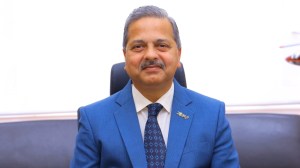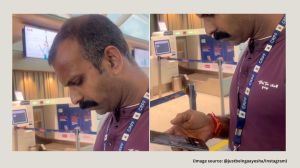Schools shut doors on handicapped
AHMEDABAD, Oct 1: Dipu Nandalal Advani, a six-year-old boy who is blind, was able to get admission in a school only after the Blind Peopl...

AHMEDABAD, Oct 1: Dipu Nandalal Advani, a six-year-old boy who is blind, was able to get admission in a school only after the Blind People’s Association appealed on his behalf.
Before Puja Zhala, also blind, could get admission to primary school only after her parents ran from school to school. She now studies at the Godavariba Sanskar Primary School.
Ajay Kumar, 10 years old and suffering from Down’s syndrome, has changed four schools in as many years. “WHY aren’t they [parents of handicapped chilren] seeking admission for their children in special schools?” asked the principal of a reputed school in the city.
The figures given by Bhushan Punani, executive director of the Blind People’s Association (BPA), would more than answer that question. Focussing only on the problem of blind students, he pointed out there were only 22 schools for the blind in the state. And there are more than 20,000 blind students. Needless to say, figures for children otherwise handicapped would add a few thousands more to that.
“The blind students in the state would need at least 500 schools, and the government simply doesn’t have the money for that,” Punani said. “Regular schools should be more accommodating”.
Moreover, the law requires regular schools to do so. The Persons with Disabilities (Equal Opportunities, Protection of Rights & Full Participation) Act, 1995, states in Chapter V:
“. . . the appropriate governments and the local authorities shall — (a) ensure that every child with a disability has access to free education in an appropriate environment till he attanins the age of eighteen years;
(b) endeavour to promote the integration of students with disabilities in the normal schools”.
But most administraters and school prinicipals were unaware of this. District education officer G.K. Patel did not know of the Act, and said there was no special move from the education department to integrate handicapped students into regular school. And given the complaint-focussed approach of government departments, he hastened to add: “My office hasn’t received any complaint for admission of handicapped children”.
It is not as if handicapped children are not given admission at all. Regular schools said they did not mind admitting orthopaedically handicapped students either polio afflicted, or with deformed or missing limbs.
In fact, St Xavier’s High School (Loyola Hall), Aroma High School, and many other schools, including those run by Gujarat Law Society, have orthopaedically handicapped students. It is the blind, deaf-mutes, and the mentally or otherwise handicapped most schools are reluctant to admit.
Regular schools speak of their problems in doing so, as such students require special attention and trained teachers. Aroma High School director Bhaskar Patel, said his school had some orthopaedically handicapped students, and that he did not discourage their admission. “But I think we cannot handle blind and deaf students", the director said.
Similar was the reaction of Sudhir Nanavati, managing trustee of the Gujarat Law Society, which runs some schools in Ahmedabad: “We admit the orthopaedically handicapped, but blind and deaf students are better off at special schools”.
But the argument of Punani and others working for the welfare of the handicapped is that given the shortage of special schools, and given the fact that a fund-strapped government cannot establish more, regular schools should shed their reluctance and not stop at admitting only the orthopaedically handicapped.
“It will be a great help, and it doesn’t take as much effort as they think,” said Punani. “And given the provisions of the law, in fact, it becomes their duty to do so”.
Punani wants the government and non-government agencies to create more awareness about the law. He also admits they need to encourage schools that are doing amitting the handicapped and provide them with specialist teachers more regularly. “Ordinary teachers, too, with a little training, can do the job,” he said.
Punani cited the example of the Unnati High School, Ahmedabad, which has more than 30 handicapped students, and that of Nutan Fellowship School, which has been admitting blind students since the sixties. They are certainly doing better than a reputed girls school in the city. Its principal, like many others, was unaware of the law, but did not even want to speak about the problem of admitting handicapped students.


- 01
- 02
- 03
- 04
- 05





























